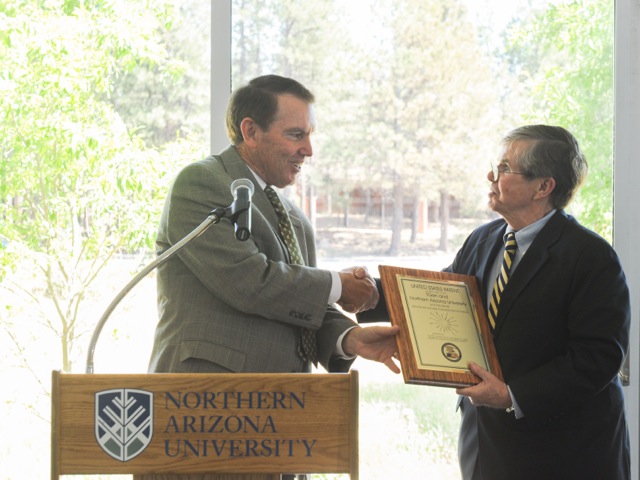Northern Arizona University and the Translational Genomics Research Institute announced today a five-year agreement to promote innovation and quality research benefiting Arizona.
The agreement implements the allocation of state funding, as directed by Gov. Jan Brewer and the Arizona Legislature, and reaffirms the commitment of both institutions toward quality research, training and educational opportunities, protection of public health and improved patient care.
The governor and Legislature recommitted state funding as part of the 2014-15 state budget, recognizing the positive dividends from a viable, competitive bioindustry in Arizona.
“TGen has played a valuable role in developing and advancing Arizona’s bioscience industry,” Brewer said. “From delivering medical breakthroughs and first-rate research to creating quality jobs and growing our economy, TGen is a shining example of the innovative companies we seek to attract and expand in Arizona. By enhancing the successful partnership between TGen and NAU, we can ensure that both our bioscience industry and our economy will continue to thrive for years to come.”
NAU and TGen also announced that they have received patent approval for a new set of genetically based tests that accurately identify fungal pathogens that threaten public health worldwide. Broad-based identification of fungi is essential for clinical diagnostics and also for environmental testing. This is the first of many patents anticipated through NAU-TGen collaborations.
The two institutions also are celebrating other joint research, including highly accurate genetically based tests for detecting and monitoring Valley Fever, influenza and different types of staph bacteria infections, especially the potentially deadly Methicillin-resistant Staphylococcus aureus, also known as MRSA.
These achievements and numerous other collaborations under way between NAU and TGen were celebrated today at NAU’s Applied Research and Development building.
The NAU-TGen developed genetic-based tests allow real-time tests in any location, including laboratories, clinics, physician offices, emergency rooms and even field settings. Immediate diagnosis of pathogens is a critical part of TGen’s push for precision medicine, in which patients receive the correct treatments as quickly as possible, speeding their recovery and saving lives.
The genetic-based tests for various pathogens were developed by a team from NAU and TGen that includes Paul Keim, director of TGen’s Pathogen Genomics Division (also known as TGen North) in Flagstaff, and a Regents professor and Cowden Endowed Chair in Microbiology at NAU.
“These advanced diagnostics have far-reaching implications for protecting public health, quickly treating patients and lowering the cost of healthcare,” Keim said. “Through our joint NAU-TGen research, we are continuing to develop tools and technologies that have a great impact on human health.”
This joint effort has generated other intellectual property, stimulated the founding of a startup company and now generates licensing revenues for both NAU and TGen.
“Our relationship with TGen exemplifies the importance of the biosciences to NAU and to Arizona’s economy,” said NAU President John Haeger. “An important mission of our university is to produce research with direct benefits to the state and to the world, and together with TGen that is what we are accomplishing. We look forward to much more.”
Jeffrey Trent, TGen president and research director, praised Haeger, Brewer and the Arizona Legislature for helping ensure TGen’s continuing role in stimulating local research that directly benefits Arizona patients.
“We are enormously grateful to Governor Brewer and the state Legislature, particularly the leadership, for their continuing confidence and support in us,” Trent said. “In addition, as demonstrated by the leadership and cooperation of President Haeger, Dr. Keim and NAU, there is no question that these types of collaborations between universities and research institutions can result in significant commercial applications.”



